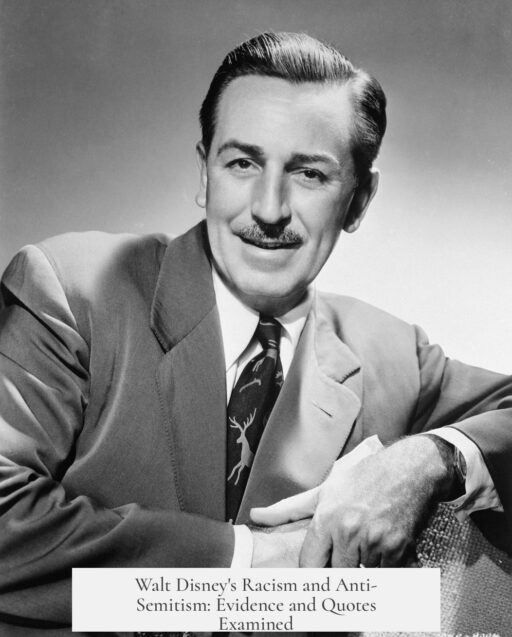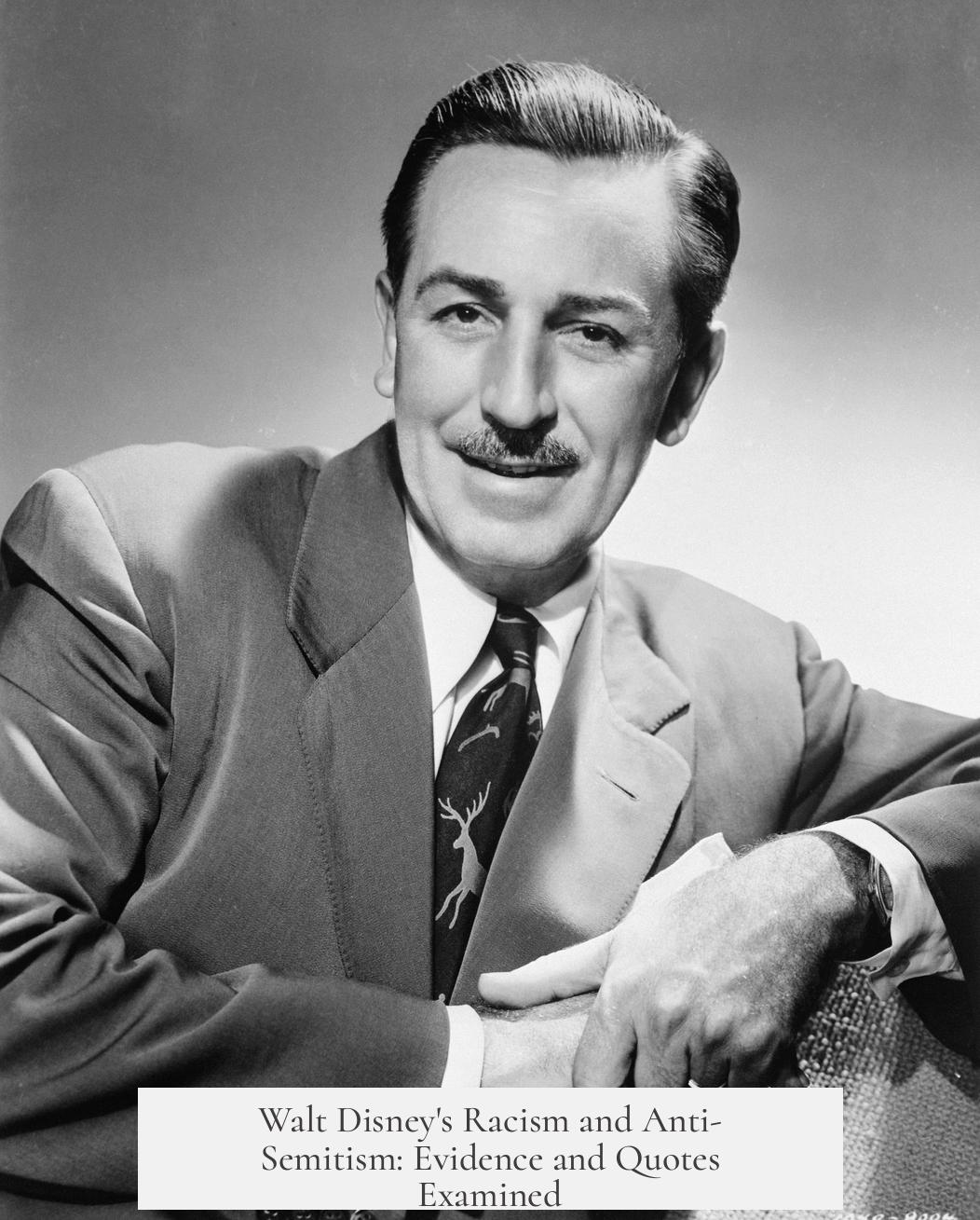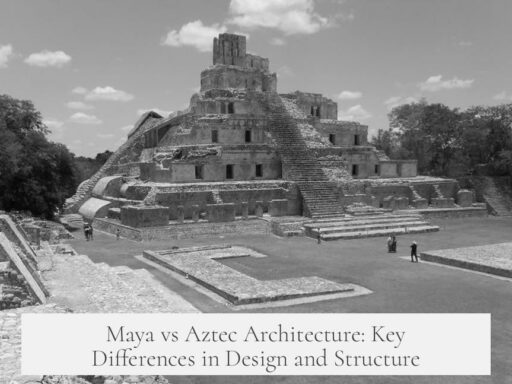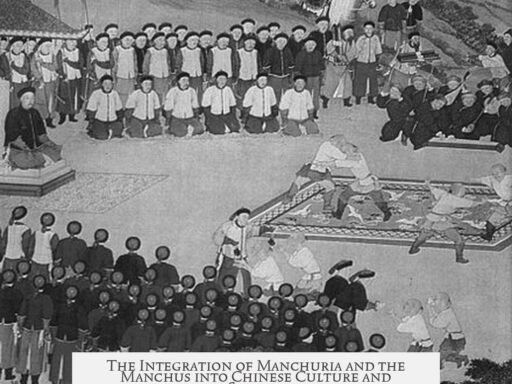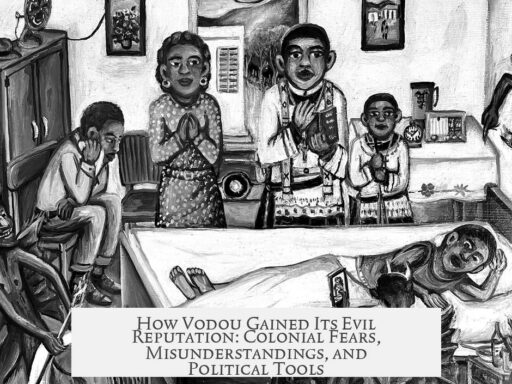Walt Disney is commonly accused of being racist or anti-Semitic; however, no direct evidence or explicit quotes confirm he personally held such views. Instead, his behavior fits a profile of political naiveté and cultural conformity to his era, coupled with some strategic alliances that have led to these accusations.
Walt Disney lived in a time when overt racism and exclusionary attitudes were common in American society. His outlook reflected this cultural context rather than any documented personal animus. He was politically obtuse, mainly focused on expanding his studio and brand. For example, in 1941, during World War II, he once dismissed concerns about the war’s impact on his company by saying, “What war?” This demonstrates a narrow focus rather than a broader ideological stance.
The key to understanding the controversy lies in Walt’s political alignments, especially his response to the Disney animators’ strike of 1941. Disney felt deeply betrayed by the strike and began blaming communists for the labor unrest. Afterward, he aligned with conservative groups fighting against union influence in Hollywood.
One such group was the Motion Picture Alliance (MPA), formed in 1944 to combat supposed communist and fascist influence in the film industry. This association is central to accusations of anti-Semitism. While the MPA included many major Hollywood figures and was openly red-baiting, it also harbored undercurrents of anti-Semitism, though this was rarely spoken aloud.
Walt Disney became a vice-president and vocal supporter of the MPA. He used this role to argue before the House Un-American Activities Committee that communist infiltration threatened Hollywood. There are no records of him using explicitly anti-Semitic language, but by aligning with a group known for subtle anti-Semitic undertones, he indirectly associated himself with such sentiments.
The FBI noted that “every person’s anti-Semitic will attempt to rally around the MPA,” reflecting the organization’s reputation. Walt’s choice to overlook or dismiss these undertones—for he reportedly believed accusations were communist smears—meant he absorbed their reputation. His position as the only non-Jewish major Hollywood studio head intensified scrutiny of his alliances and actions.
Disney’s association with the MPA, combined with his conservative turn post-strike and avoidance of social awareness beyond his studio, is why some label him racist or anti-Semitic. However, this is more about political and social alignment than clear personal evidence. There are no known direct quotes or documented statements by Disney expressing racial or religious hatred explicitly.
Disney’s films have drawn criticism for racial stereotypes common in animation of the 1930s and 1940s. These portrayals mirrored widespread cultural biases rather than a personal agenda. Over time, Disney Studios have recognized and corrected many of these issues.
To summarize key points:
- Walt Disney reflected broadly accepted cultural views of his era, which included racial and ethnic biases.
- He was politically limited and narrowly focused, not known for vocal or explicit racist or anti-Semitic remarks.
- The Disney animators’ strike shaped his conservative political stance and suspicion of unions and communists.
- He joined the Motion Picture Alliance—a conservative, red-baiting group with known anti-Semitic undertones.
- Disney ignored allegations of anti-Semitism within the MPA, possibly viewing them as communist propaganda.
- His public association with the MPA has tainted his legacy, though no direct evidence shows he personally espoused racism or anti-Semitism.
- His films include dated racial stereotypes consistent with the time, not necessarily a reflection of personal animus.
Ultimately, Walt Disney’s legacy is complex. He aligned with groups that held problematic views but did not leave a clear record of personal racist or anti-Semitic beliefs. The accusations often arise from his political affiliations and cultural context rather than direct evidence or quotes.
Unpacking Walt Disney’s Reputation: Was He Really Racist or Anti-Semitic?
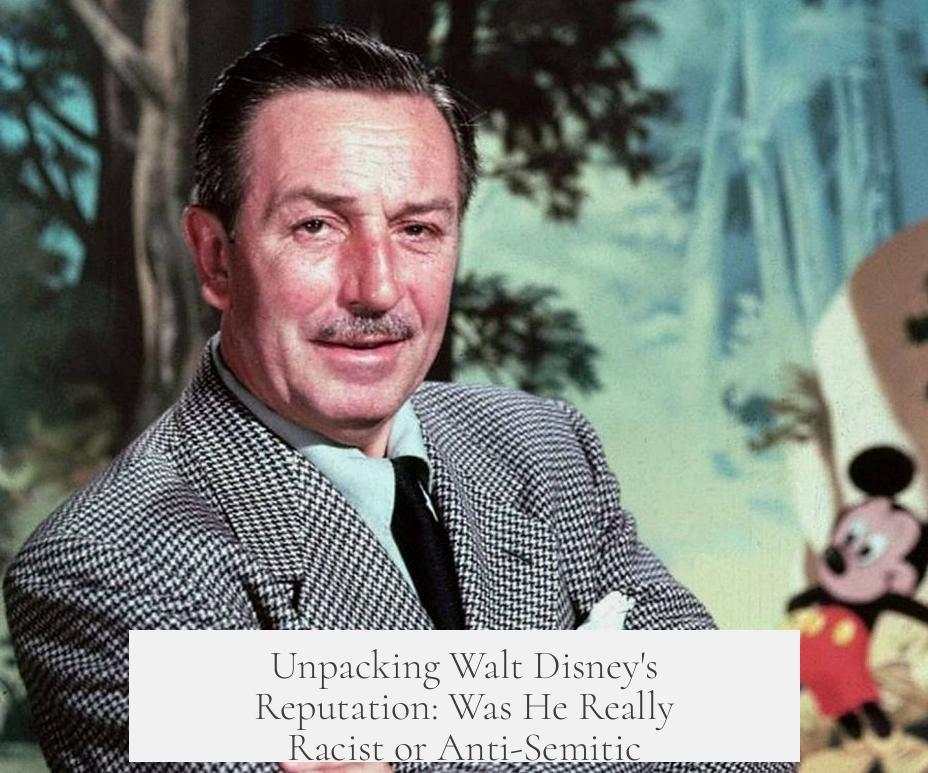
Walt Disney is commonly accused of being racist or anti-Semitic, but is there solid evidence or direct quotes from him supporting these claims? The short answer is: no clear-cut proof exists that Walt Disney openly expressed racist or anti-Semitic views. Instead, what we find is a more complex story shaped by his cultural environment, political naivety, and certain controversial alliances.
This exploration navigates the murky waters of Walt’s reputation, aiming to clarify the truth behind the accusations. So, buckle up for a journey through history, politics, union conflicts, and Hollywood’s conservative circles.
1. Walt Disney’s Cultural Racism: A Product of His Time
First, it’s crucial to grasp what “cultural racism” means in Walt’s context. He was not an outspoken bigot seeking to undermine minorities consciously. Instead, he fit the mainstream attitudes typical of many white Americans of his era. Research suggests Walt aligned with prevailing cultural biases rather than leading or aggressively promoting them.
He was also politically obtuse—meaning his focus was nearly obsessively on the Disney brand (films, parks, merchandising), leaving little mental bandwidth for social or political awareness. An amusing yet telling anecdote comes from 1941 during Fantasia’s decline. When asked how WWII might affect the studio, Walt responded bluntly, “What war?” This detachment indicates a man more consumed with animation than worldly affairs.
2. The Disney Animators’ Strike: The Turning Point
If you want to understand Walt’s political stance, the Disney animators’ strike is your key event. The strike in the 1940s left Walt feeling betrayed by his own team and union organizers. It cut deep emotionally and altered his worldview.
To recover from the damage, Walt took a goodwill trip across Latin America, leading to films like Saludos Amigos and The Three Caballeros. Yet, during his absence, arbitration favored the union, effectively formalizing Disney’s studio unionization — something Walt bitterly opposed.
This string of events planted distrust of unions and a tendency to blame communists, which colored Walt’s subsequent political alliances.
3. His Alliance with the Motion Picture Alliance: A Double-Edged Sword
Walt’s political reaction to the strike pushed him into conservative Hollywood circles. Notably, he joined the Motion Picture Alliance (MPA), a group aimed at rooting out Communist and Fascist influences in Hollywood.
The MPA included big stars like Ronald Reagan and John Wayne and functioned as a red-baiting, reactionary organization. While outward anti-Semitism was never openly declared, rumors and covert undertones of anti-Jewish sentiment swirled around the group.
FBI agents even noted that people with anti-Semitic tendencies gravitated toward the MPA. Walt, however, embraced the group mainly as a platform against unions and communists. As a vice-president of the MPA, he became one of their most vocal spokesmen, testifying about Communist infiltration during the infamous House Un-American Activities hearings.
4. Did Walt Disney Ignore Anti-Semitism in the MPA?
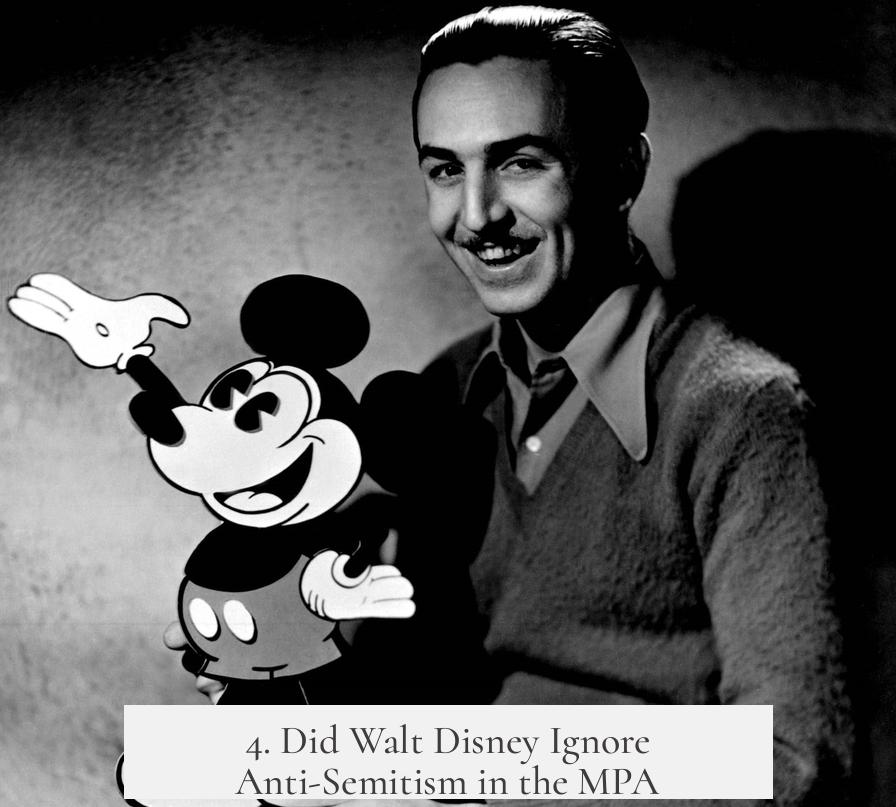
Here’s the thorny part: Walt Disney undoubtedly knew about the anti-Semitic whispers linked with the MPA. Yet, many historians argue he dismissed them, possibly seeing the allegations as communist smears.
Regardless of his personal beliefs, this alliance has deeply tarnished Walt’s legacy. Scholars say his choice to stand beside the MPA meant sharing their burden of suspicion. And, notably, Walt was among the very few non-Jewish studio heads in Hollywood. This made his embrace of the MPA even more controversial and cast additional shadow on his profile.
So, Is There Any Direct Evidence or Quotes?
Surprisingly, nobody has uncovered a bombshell quote from Walt explicitly supporting racist or anti-Semitic ideas. The accusations mostly stem from his relationships and choices—not explicit statements.
Instead of being a notorious bigot, Walt appears as a man shaped strongly by his era’s commonplace biases and political realities. He made choices that aligned him with problematic groups, but he did not publicly hammer home racist or anti-Jewish rhetoric himself.
What Can We Learn From This?
This case reminds us that judging historical figures is rarely black and white. Walt Disney’s story is a tangle of brilliant innovation, cultural blind spots, political mistakes, and complex human flaws.
- Walt’s focus on his craft meant less political awareness and flexibility.
- The animators’ strike severely impacted his trust and worldview.
- His alliance with the MPA highlights how political alliances can have unexpected reputational costs.
- No definitive quotes exist to prove he was an active racist or anti-Semite.
Understanding Walt Disney requires balancing his creative legacy with critical awareness of his political and cultural environment.
Final Thoughts: Can We Separate Art from Artist Here?
Walt Disney’s empire shaped childhoods globally. Yet, stopping short at uncritically praising him ignores important nuances about his personal politics and alliances.
Does that make us pause and reconsider? Perhaps. Does it mean we should discard his creative achievements? Not necessarily. Recognizing Walt’s imperfections helps us appreciate the human complexity behind the iconic brand. It also encourages ongoing discussions about culture, power, and history.
In the end, Walt Disney wasn’t the outspoken racist or anti-Semite some claim him to be. He was, instead, a man molded by his time, who sometimes aligned with problematic groups out of fear or political convenience—not conviction.
And sometimes, that distinction matters. Don’t you agree?
Was Walt Disney openly racist or anti-Semitic in his statements or actions?
There is no strong evidence that Walt Disney made openly racist or anti-Semitic remarks. He was culturally typical of his time but did not publicly promote hate. His focus was mainly on his studios and family.
How did Walt Disney’s politics relate to accusations of racism or anti-Semitism?
Disney aligned with conservative groups to oppose unions, which led him to join the Motion Picture Alliance. This group had known anti-Semitic undertones, which associates him indirectly with such views.
Did Walt Disney’s association with the Motion Picture Alliance prove he was anti-Semitic?
Though the Alliance had anti-Semitic members, Walt never expressed those views openly. He joined mostly to fight Communist influence. His connection brought suspicion but no direct proof of personal anti-Semitism.
Are there any quotes from Walt Disney supporting accusations of racism or anti-Semitism?
No quotes from Walt Disney explicitly support such accusations. He remained silent on these issues publicly, focusing more on his work and denying or ignoring the politics of groups he associated with.
How did the Disney animators’ strike influence perceptions of Walt Disney’s political views?
The strike deeply hurt Walt and led him to blame unions and communists. This fueled his shift toward conservative politics, indirectly affecting his associations and the accusations tied to those political stances.
